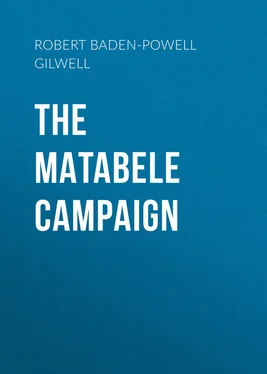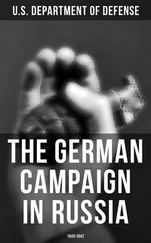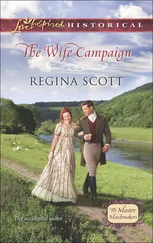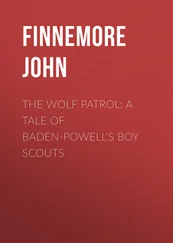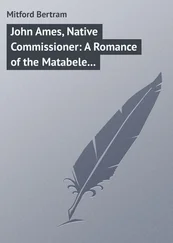Robert Baden-Powell of Gilwell - The Matabele Campaign
Здесь есть возможность читать онлайн «Robert Baden-Powell of Gilwell - The Matabele Campaign» — ознакомительный отрывок электронной книги совершенно бесплатно, а после прочтения отрывка купить полную версию. В некоторых случаях можно слушать аудио, скачать через торрент в формате fb2 и присутствует краткое содержание. Жанр: foreign_antique, foreign_prose, на английском языке. Описание произведения, (предисловие) а так же отзывы посетителей доступны на портале библиотеки ЛибКат.
- Название:The Matabele Campaign
- Автор:
- Жанр:
- Год:неизвестен
- ISBN:нет данных
- Рейтинг книги:5 / 5. Голосов: 1
-
Избранное:Добавить в избранное
- Отзывы:
-
Ваша оценка:
- 100
- 1
- 2
- 3
- 4
- 5
The Matabele Campaign: краткое содержание, описание и аннотация
Предлагаем к чтению аннотацию, описание, краткое содержание или предисловие (зависит от того, что написал сам автор книги «The Matabele Campaign»). Если вы не нашли необходимую информацию о книге — напишите в комментариях, мы постараемся отыскать её.
The Matabele Campaign — читать онлайн ознакомительный отрывок
Ниже представлен текст книги, разбитый по страницам. Система сохранения места последней прочитанной страницы, позволяет с удобством читать онлайн бесплатно книгу «The Matabele Campaign», без необходимости каждый раз заново искать на чём Вы остановились. Поставьте закладку, и сможете в любой момент перейти на страницу, на которой закончили чтение.
Интервал:
Закладка:
At last I called a halt. Our horses were done, the niggers were all scattered, and there were almost as many left behind us hiding in bushes as there were running on in front.
A few minutes spent in breathing the horses, and a vast amount of jabber and chaff, and then we reformed the line and returned at a walk, clearing the bush as we went.
I had one shave. I went to help two men who were fighting a Kafir at the foot of a tree, but they killed him just as I got there. I was under the tree when something moving over my head caught my attention. It was a gun–barrel taking aim down at me, the firer jammed so close to the tree–stem as to look like part of it. Before I could move he fired, and just ploughed into the ground at my feet.
He did not remain much longer in the tree. I have his knobkerrie and his photo now as mementos.
At length we mustered again at our starting–point, where the guns and ambulance had been left. We found that, apart from small scratches and contusions, we had only four men badly wounded. One poor fellow had his thigh smashed by a ball from an elephant gun, from which he afterwards died. Another had two bullets in his back. Four horses had been killed.
And the blow dealt to the enemy was a most important one. A prisoner told us that the impi was composed of picked men from all the chief regiments of the rebel’s forces, and that a great number of the chiefs were present at the fight.
[ P.S. – We learned some months afterwards from refugees and surrendered rebels that this was true, and that no less than fifteen headmen had been killed, as well as more than two hundred of their men.]
Of course this was a very one–sided fight, and it sounds rather brutal to anyone reading in cold blood how we hunted them without giving them a chance – but it must be remembered we were but 250 against at least 1200. Lord Wolseley says “when you get niggers on the run, keep them on the run” (this we did, for half a mile beyond the spot where we pulled up, Beal with his column cut in from the flank and bashed them from a new direction), and our only chance of bringing the war to a speedy end is to go for them whenever we get the chance, and hit as hard as ever we can: any hesitation or softness is construed by them as a sign of weakness, and at once restores their confidence and courage. They expect no quarter, because, as they admit themselves, they have gone beyond their own etiquette of war, and have killed our women and children. We found one wounded man who had hanged himself after the fight. This is not an uncommon occurrence in these fights.
[ P.S. – I did not at the time fully realise the extraordinary bloodthirsty rage of some of our men when they got hand to hand with the Kafirs, but I not only understood it, but felt it to the full myself later on, when I too had seen those English girls lying horribly mutilated, and the little white children with the life smashed and beaten out of them by laughing black fiends, who knew no mercy.]
Don’t think from these remarks that I am a regular nigger–hater, for I am not. I have met lots of good friends among them – especially among the Zulus. But, however good they may be, they must, as a people, be ruled with a hand of iron in a velvet glove; and if they writhe under it, and don’t understand the force of it, it is of no use to add more padding – you must take off the glove for a moment and show them the hand. They will then understand and obey. In the present instance they had been rash enough to pull off the glove for themselves, and were now beginning to find out what the hand was made of.
After the fight I made tracks for Buluwayo, got in in time for late lunch, made up for lost time in the office, and was quite ready to go to bed soon after dinner. But I called in at the club on my way, to have a peep at the wonderfully picturesque collection of warriors, who were, many of them, – most of them in fact, – still in their fighting–kit (for many had no other), talking over the day’s doings.
7th June. – Rode out early, with a police–orderly to guide me, to inspect the fort at Hope Fountain, ten miles south of Buluwayo, from which one could just see the tops of Matopo Mountains, in which so many of the rebel chiefs are said to be taking up their position. This fort had been attacked about ten days ago, but the enemy never came on with any boldness, and drew off after losing eleven killed. The mission station close by, a very pretty little homestead with nice gardens and trees, had been looted and burnt by the rebels.
I got back to Buluwayo just in time to see Spreckley’s column march off to patrol the country north–east of Buluwayo. A fine body of 400 of the roughest, most workman–like fighters one could wish to see. It comprised both infantry and mounted infantry, artillery, and a levy of wild–looking friendly Matabele.
In the afternoon I rode over yesterday’s battlefield with Vyvyan, recovered my gun, – which, by the way, Sir Frederick has christened “Rodney,” – and photographed the chap who potted me out of the tree.
8th and 9th June. – Office work from early morning up to late at night.
10th June. – Lunched with Maurice Gifford, who had lost his arm in one of the first fights of the war. He is not really in a fit state to be about, – it still hurts him badly, poor chap, and he is a bit feverish, – but quite anxious to have another go at the enemy. He says he feels the pain as if it were in his hand, whereas the arm was taken off at the shoulder.
News came in from MacFarlane of a skirmish he had had near Redbank.
In the afternoon I rode out with Vyvyan to Taba–s’–Induna, a flat–topped hill that stands up bold and abruptly out of the sea–like veldt ten miles from Buluwayo. It was the place of execution for many of Lobengula’s Indunas. Beautiful view from the top over a widespread yellow prairie, with sharp blue mountains on the horizon.
11th June. – The hospital, which has a number of wounded men among its sick, stands away at one corner of the town, and is fortified and garrisoned in case of attack. Eight nuns work their lives out nursing there, and the men, if not demonstrative, are to the full appreciative and grateful, and would do anything for them.
Close to the hospital, on a rise, stands the “Eiffel Tower”: a skeleton look–out tower about 80 feet high, from which the country round for many miles can be watched. The look–out man to–day says he can see a fight going on in the far distance to the north, apparently somewhere in MacFarlane’s direction.
De Moleyns, adjutant of the 4th Hussars, arrived from England, anxious for a job, and we took him on as head of the Remount Department.
12th June. – Office as per usual. But vague rumours of what the enemy are doing in the Matopos made me impatient, especially owing to their vagueness. So in the evening I started off with Burnham, the American scout, to go and investigate. Delightful night ride to Kami Fort, sixteen miles south–west of Buluwayo. Jam, cookies, and tea with the two officers there, and a few hours’ sleep on that best of beds – the veldt tempered with a blanket and a saddle.
13th June. – At 4 a. m. we were off again, Burnham and I and Trooper Bradley of the Mounted Police, who knew this part of the country well.
We got to Mabukutwane Fort – one of the natural koppies strengthened with sandbags, etc. – in time for breakfast. Here we found some excitement, as a transport rider in charge of waggons had just come in from the road, reporting that he had been fired on by Matabele about two miles out. A patrol was sent out, and we sent warnings to waggons and to the coach, which was due to pass to–day, telling them to wait at the fort till the road had been reconnoitred. It ended in nothing – the patrol returned having found no Matabele nor any spoor of them.
Читать дальшеИнтервал:
Закладка:
Похожие книги на «The Matabele Campaign»
Представляем Вашему вниманию похожие книги на «The Matabele Campaign» списком для выбора. Мы отобрали схожую по названию и смыслу литературу в надежде предоставить читателям больше вариантов отыскать новые, интересные, ещё непрочитанные произведения.
Обсуждение, отзывы о книге «The Matabele Campaign» и просто собственные мнения читателей. Оставьте ваши комментарии, напишите, что Вы думаете о произведении, его смысле или главных героях. Укажите что конкретно понравилось, а что нет, и почему Вы так считаете.
